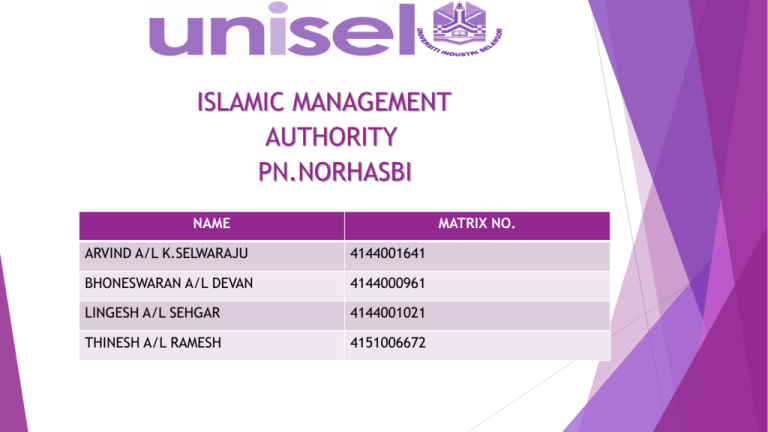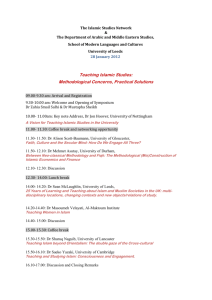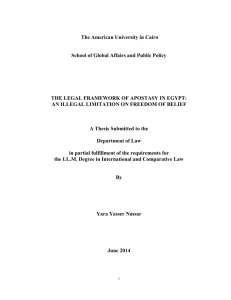5.Authority - WordPress.com
advertisement

ISLAMIC MANAGEMENT AUTHORITY PN.NORHASBI NAME MATRIX NO. ARVIND A/L K.SELWARAJU 4144001641 BHONESWARAN A/L DEVAN 4144000961 LINGESH A/L SEHGAR 4144001021 THINESH A/L RAMESH 4151006672 INTRODUCTION AUTHORITY Authority is the power which is legitimized within specific social context. Allows certain people to exert influence by virtue of their position in the hierarchy of an organization. The Qur’an further teaches that legitimate human power and authority exists for one and only one function to “establish regular prayers and practice regular charity and enjoin the right and forbid the wrong AUTHORITY IN ISLAM Authority in Islam is limited within framework of Muslim and the interest of the organization. Limited by culture of participative decision making, includes better quality and better productivity. Authority in Islam is balanced by the process of enjoining what is right and forbidding what is wrong CONCEPT OF AUTHORITY IN ISLAM It has been conspicuous that the entire Sahaba's ultimate decency conception did create a factual authority that installed seeable effects on jurisprudential and political life of Islam This authority occupied the position of the doctrinal one defined by God and explicated by the Prophet of God, owing to ordinary transmission and imitation THE CONCEPT OF POLITICAL AUTHORITY the Islamic law (shari‟ah) confers upon all adult Muslims, with the possible exception of some convicted criminals, equal political rights, irrespective of race, colour or socio-economic status. The basis of establishment of the state in Islam is to enable individuals to lead a true Islamic life and this purpose can be achieved only when the individuals enjoy all their rights fully at the persuasion of the state TWO PRINCIPLES ACCEPTED BY THE ISLAMIC SHARI‟AH IN BASIS OF POLITICAL AUTHORITY i. Islam does not approve of a state based on the domination and power of one person or one political party only (authoritarian system of government). ii. The responsibility of the community ( ummah) to enforce Islamic laws and to follow the shari‟ah in all sphere of life THE CLASSICAL CONCEPT OF AUTHORITY • The Islamic history has shown that the questions of political authority in the Muslim world were never realistically solved • Rulers never succeeded in gaining full and total recognition of the jurists and if they did , it was out of necessity and expediency THE DELEGATION OF AUTHORITY • Given the fact that the Muslims enjoy equal political rights by virtue of the idea of vicegerent (khalifah) • the Islamic law requires, under normal circumstances, that the exercise of such rights on their behalf be based upon their free authorization, • the point here is to examine the legal rules that make such authorization imperative for the validity of political representation in Muslim state. THERE ARE TWO LEGAL REASONS FOR REQUIRING SUCH AUTHORIZATION:- I. The function of political representation constituted an exercise of public authority (wilayah) over the society (Muslimummah), and the decisions made by the members of the assembly are binding upon society (their constituents). ii. the legal exercise of the rights of others on their behalf, including the right of consultation, requires contractual authorization to represent ( „aqdwakalah) by virtue of which the rights and obligations of both parties to the contract are defined. Only applicable in three cases.. a) judicial representation (niyabahqada‟iyyah) in which a representative is appointed by a court of law b) contractual authorization (niyabah „aqdiyyah), as in the case of appointment of a deputy for the purpose of acting on one’s behalf („aqdwakalah) c) legal representation of a minor (niyabahshar‟iyyah), such as his father,represents his interest TYPES OF AUTHORITY CAN EXIST WITHIN ORGANIZATION. LINE AUTHORITY The most fundamental authority within an organization, reflects existing superior-subordinate relationships. STAFF AUTHORITY Staff authority consists of the right to advise or assist those who possess line authority as well as other staff personnel. FUNCTIONAL AUTHORITY Functional authority consists of the right to give orders within a segment of the organization in which this right is normally non existent CONCLUSION Authority in Islam is balanced by the process of enjoining what is right and forbidding what is wrong Authority in Islam is limited within framework of Muslim and the interest of the organization











